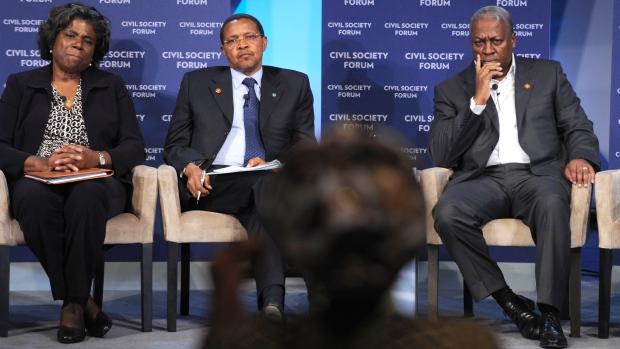Donors have increasingly sought to influence democratic outcomes through foreign development assistance in African countries over the past two decades. But aid’s capacity to bolster democracy is limited when aid is not directed at supporting civil society and opposition groups. Advancing democracy may be difficult when, as the Guardian’s Chris McGreal noted in his coverage of this week’s US-Africa Leaders Summit, the US and other donors prioritize security and give substantial assistance to incumbent governments.

Panelists, from left, Assistant Secretary of State for African Affairs Linda Thomas-Greenfield,Tanzanian President Jakaya Kikwete, and Ghana's President John Dramani Mahama Civil Society Forum at 2014 US-Africa Leaders Summit, August 4, 2014(Source: Susan Walsh/Associated Press)
Simone Dietrich and Joseph Wright, members of the AidData Research Consortium, conducted a 2014 study to determine how foreign aid influences transitions to multiparty regimes and democratic consolidation. Part of their answer is, aid might catalyze transitions to multipartyism and stabilize multipartyism once it is adopted. However, the extent to which aid increases electoral competition so that opposition parties can challenge incumbent governments is limited. This is especially true when incumbents receive the majority of aid. Dietrich and Wright find that the majority of democracy and governance assistance (DGA) to Africa between 1989-2008 was direct investment in strengthening state institutions. Only a small fraction of these democracy-promotion activities targeted civil society groups, as shown in the graph below.

Democracy and Governance Aid (DGA), share of total aid by yearOriginally published in, “Foreign Aid Allocation Tactics and Democratic Change in Africa”(Data sources: AidData.org and WDI)
Donors’ decisions about where they target their dollars and at whom they target them have political consequences that are often overlooked. By differentiating between two types of development assistance (economic aid and democratic aid) and two channels through which this assistance is delivered (government and civil society), Dietrich and Wright explore how foreign aid influences democratic outcomes in sub-Saharan African countries during the post-Cold War period. When donors target aid at governments in attempt to improve state capacity, they may strengthen the incumbent government. This support can then make it more difficult for opposition parties to win elections, as compared to when donors target aid at civil society and opposition groups.
Dietrich and Wright examine transitions to and from multiparty regimes in 48 countries as an entry point to assessing the influence of foreign aid on democracy. In contrast to most existing cross-national research on aid and democracy, they examine more direct, observable measures of democratic outcomes than the often used indices from the Polity Project or Freedom House. Instead, Dietrich and Wright distinguish between different stages of democratic consolidation. While multipartyism is central to democracy, it does not capture all aspects of democratic consolidation. Dietrich and Wright also examine observed electoral misconduct and opposition electoral support, the latter measured as vote shares for opposition parties.
Their findings suggest that while economic aid may catalyze transitions to multipartyism, and democratic aid may help stabilize multiparty regimes, there is little evidence that foreign aid threatens incumbent governments by increasing opposition groups’ competitiveness. Therefore, if foreign donors want to support the kind of democratic change that fosters vertical accountability by increasing electoral competition in African countries, they might do so more effectively by channeling aid through civil society groups rather than incumbent-led governance programs.
These findings challenge studies that cast foreign aid as an enemy of democracy, as Dietrich and Wright show a strong link between economic aid and transitions to regimes. However, they also find that economic assistance, which is the bulk of total aid to the region, does not influence democratic consolidation outcomes such as the duration of multi-party systems and increased electoral competition. Although Dietrich and Wright find that democracy assistance, most of which flows to aid recipient governments and not to civil society, is associated with more stable multiparty systems and fair elections, there is little evidence that it boosts electoral competition. Thus, the “picture is more complicated” than either aid critics or aid apologists maintain. As Dietrich and Wright suggest, fair elections may not necessarily threaten incumbents in the same way that increasing opposition parties’ chances of winning might.
